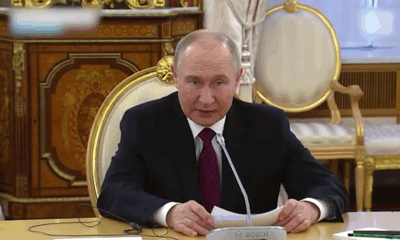Science & Technology
Moon landing: US clinches first touchdown in 50 years
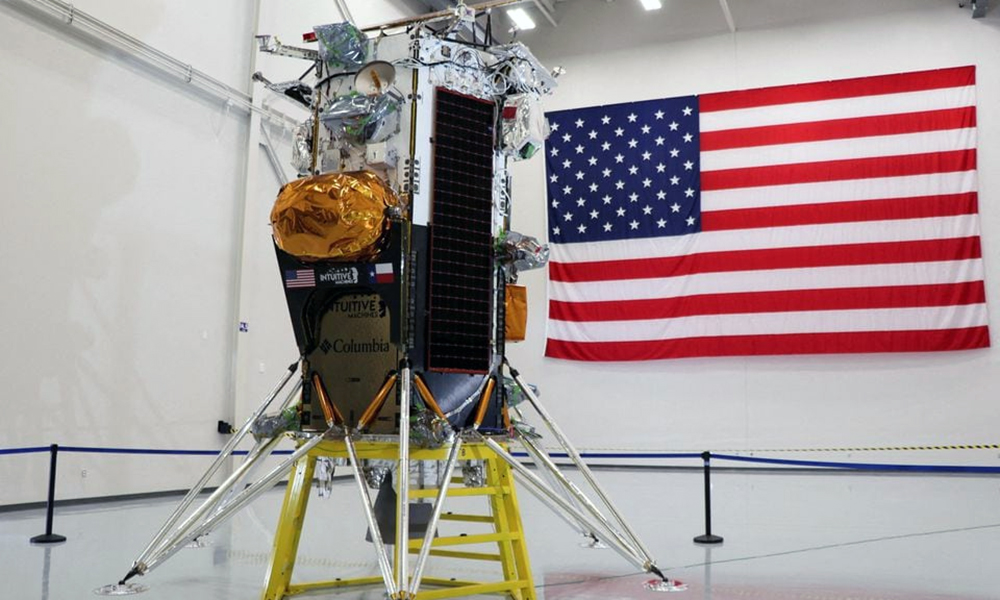
A spacecraft built and flown by Texas-based company Intuitive Machines landed near the south pole of the moon on Thursday, the first U.S. touchdown on the lunar surface in more than half a century and the first ever achieved by the private sector, Reuters reported.
The uncrewed six-legged robot lander, dubbed Odysseus, touched down at about 6:23 p.m. EST (2323 GMT), the company and NASA commentators said in a joint webcast of the landing from Intuitive Machines’ (LUNR.O), opens new tab mission operations center in Houston.
The landing capped a nail-biting final approach and descent in which a problem surfaced with the spacecraft’s autonomous navigation system that required engineers on the ground to employ an untested work-around at the 11th hour.
It also took some time after an anticipated radio blackout to re-establish communications with the spacecraft and determine its fate some 239,000 miles (384,000 km) from Earth.
When contact was finally renewed, the signal was faint, confirming that the lander had touched down but leaving mission control immediately uncertain as to the precise condition and position of the vehicle, according to the webcast.
“Our equipment is on the surface of the moon, and we are transmitting, so congratulations IM team,” Intuitive Machines mission director Tim Crain was heard telling the operations center. “We’ll see what more we can get from that.”
NASA Administrator Bill Nelson immediately hailed the feat as a “triumph,” saying, “Odysseus has taken the moon.”
As planned, the spacecraft was believed to have come to rest at a crater named Malapert A near the moon’s south pole, according to the webcast. The spacecraft was not designed to provide live video of the landing, which came one day after the spacecraft reached lunar orbit and a week after its launch from Florida, read the report.
Thursday’s landing represented the first controlled descent to the lunar surface by a U.S. spacecraft since Apollo 17 in 1972, when NASA’s last crewed moon mission landed there with astronauts Gene Cernan and Harrison Schmitt.
To date, spacecraft from just four other countries have ever landed on the moon – the former Soviet Union, China, India and, mostly recently, just last month, Japan. The United States is the only one ever to have sent humans to the lunar surface.
Odysseus is carrying a suite of scientific instruments and technology demonstrations for NASA and several commercial customers designed to operate for seven days on solar energy before the sun sets over the polar landing site.
The NASA payload will focus on collecting data on space weather interactions with the moon’s surface, radio astronomy and other aspects of the lunar environment for future landers and NASA’s planned return of astronauts later in the decade.
The IM-1 mission was sent on its way to the moon last Thursday atop a Falcon 9 rocket launched by Elon Musk’s company SpaceX from NASA’s Kennedy Space Center in Cape Canaveral, Florida.
The arrival of Odysseus also marks the first “soft landing” on the moon ever by a commercially manufactured and operated vehicle and the first under NASA’s Artemis lunar program, as the U.S. races to return astronauts to Earth’s natural satellite before China lands its own crewed spacecraft there, Reuters reported.
NASA aims to land its first crewed Artemis in late 2026 as part of long-term, sustained lunar exploration and a stepping stone toward eventual human flights to Mars. The initiative focuses on the moon’s south pole in part because a presumed bounty of frozen water exists there that can be used for life support and production of rocket fuel.
A host of small landers like Odysseus are expected to pave the way under NASA’s Commercial Lunar Payload Services (CLPS) program, designed to deliver instruments and hardware to the moon at lower costs than the U.S. space agency’s traditional method of building and launching those vehicles itself.
Leaning more heavily on smaller, less experienced private ventures comes with its own risks.
Just last month the lunar lander of another firm, Astrobotic Technology, suffered a propulsion system leak on its way to the moon shortly after being placed in orbit on Jan. 8 by a United Launch Alliance (ULA) Vulcan rocket making its debut flight.
The malfunction of Astrobotic’s Peregrine lander marked the third failure of a private company to achieve a lunar touchdown, following ill-fated efforts by companies from Israel and Japan.
Although Odysseus is the latest star of NASA’s CLPS program, the IM-1 flight is considered an Intuitive Machines mission. The company was co-founded in 2013 by Stephen Altemus, former deputy director of NASA’s Johnson Space Center in Houston and now the company’s president and CEO.
The proliferation of commercial space ventures has itself been driven by leaps in technology in recent decades.
The Apollo program and robot lunar Surveyor missions that preceded it flew at the very dawn of the computer age, before the advent of modern microchips, electronic sensors and software, or the development of super light-weight metal alloys and myriad other advances that have spurred a revolution in spaceflight.
Science & Technology
Saudi crown prince launches new company to develop AI technologies
U.S. President Donald Trump travels to Saudi Arabia this week, the first stop on his Gulf tour, and AI is expected to be a major discussion point during Tuesday’s joint Saudi-U.S. investment forum in Riyadh.

Crown Prince Mohammed bin Salman launched a new company to develop and manage artificial intelligence technologies in Saudi Arabia on Monday, a top priority of its economic diversification drive, Reuters reported.
U.S. President Donald Trump travels to Saudi Arabia this week, the first stop on his Gulf tour, and AI is expected to be a major discussion point during Tuesday’s joint Saudi-U.S. investment forum in Riyadh.
The kingdom, the world’s biggest crude exporter, is undergoing a significant economic and social transformation under its Vision 2030 programme which aims to wean the economy off its oil dependency.
It wants to develop AI technology and infrastructure – including data centres – and has ambitions to establish the kingdom as a global centre for AI, pitching itself as a prospective hub for AI activity outside the United States, read the report.
Chaired by bin Salman, Saudi Arabia’s de facto leader, the new company, Humain, will operate under the Public Investment Fund, and offer AI services and products, including data centres, AI infrastructure, cloud capabilities and advanced AI models, the state news agency reported.
Earlier this year, cloud software seller Salesforce (CRM.N), said that it planned to invest $500 million in Saudi Arabia related to artificial intelligence.
Science & Technology
Skype ends operations after 22 years of service
Microsoft acquired Skype in 2011 and says the decision is part of a strategy to focus on its other platform, Microsoft Teams.
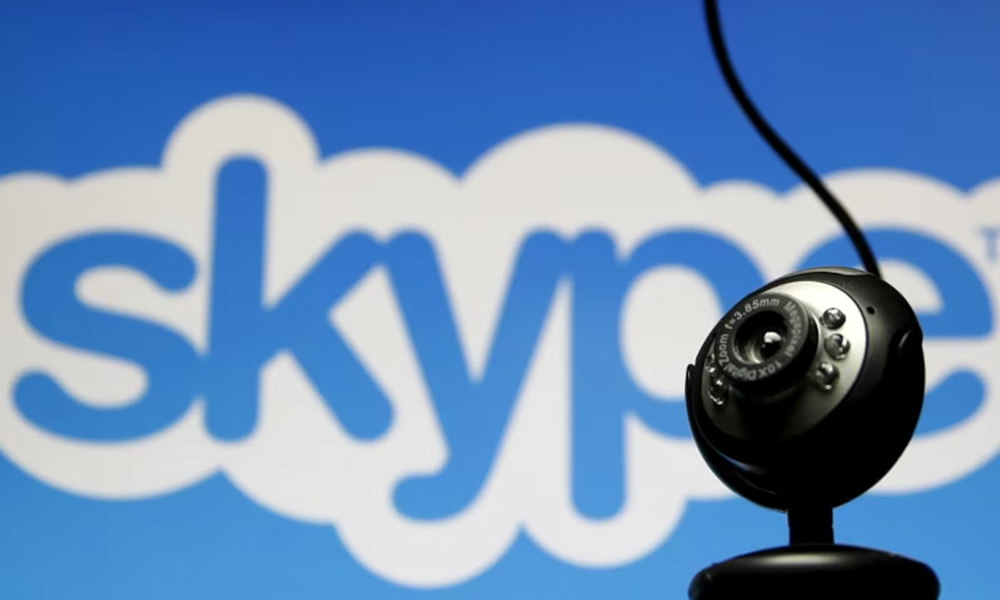
Skype officially shut down on Monday. The closure comes after nearly 22 years in operation, during which Skype became known for making international voice and video calls accessible and affordable for millions of people worldwide.
Microsoft acquired Skype in 2011 and says the decision is part of a strategy to focus on its other platform, Microsoft Teams.
Launched in 2003, Skype quickly became a revolutionary tool for free voice and video calls over the internet, amassing more than 300 million monthly users at its peak in the mid-2010s. The free platform changed how people communicated across borders, long before Zoom or FaceTime.
In 2011, Microsoft acquired Skype for $8.5bn, aiming to make it a central part of its communications strategy. But as competitors like WhatsApp, Zoom, and eventually Microsoft’s own Teams gained traction, Skype’s popularity faded.
On February 28, Microsoft said it would retire Skype on May 5 to streamline its services and prioritise Teams for communication and collaboration.
Microsoft has urged users to transition to Teams by visiting skype.com and utilising the “Start using Teams” feature. All Skype chats and contacts will remain accessible through Teams using the same login credentials.
Science & Technology
Apple moving to make most iPhones for US in India rather than China

Apple aims to make most of its iPhones sold in the United States at factories in India by the end of 2026, and is speeding up those plans to navigate potentially higher tariffs in China, its main manufacturing base, Reuters reported.
The U.S. tech giant is holding urgent talks with contract manufacturers Foxconn and Tata to achieve that goal, the person, who declined to be named as the planning process is confidential, said on Friday.
Apple and Foxconn did not immediately respond to requests for comment, while Tata declined to comment.
Apple sells over 60 million iPhones in the U.S. annually with roughly 80% of them made in China currently.
Prime Minister Narendra Modi has in recent years promoted India as a smartphone manufacturing hub, but higher duties on importing mobile phone parts compared to many other countries means it is still expensive for companies to produce in India.
For iPhones, manufacturing costs in India are 5-8% higher than in China, with the difference rising to as much as 10% in some cases, the source said.
Apple has already stepped up production in India to beat U.S. President Donald Trump’s tariffs, shipping some 600 tons of iPhones worth $2 billion to the United States in March. The shipments from India marked a record for both its contractors Tata and Foxconn, with the latter alone accounting for smartphones worth $1.3 billion, Reuters reported last week.
In April, the U.S. administration imposed 26% duties on imports from India, much lower than the more than 100% China was facing at the time. Washington has since paused most duties for three months, except for China.
Trump’s administration has since signalled openness to de-escalating the trade war between the world’s two largest economies that has raised fears of recession.
The Financial Times first reported about Apple’s plan on Friday.
As Apple diversifies its manufacturing beyond China, it has positioned India for a critical role. Foxconn and Tata, its two main suppliers there, have three factories in all, with two more being built.
-
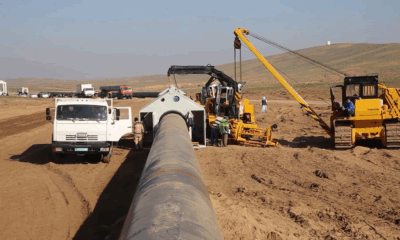
 Latest News5 days ago
Latest News5 days agoTAPI pipeline to reach Herat by end of 2025: Ministry
-

 Sport5 days ago
Sport5 days agoIPL 2025: Dharamsala match abandoned due to security concerns
-

 Regional4 days ago
Regional4 days agoIndia says military stations attacked by Pakistan drones and missiles
-
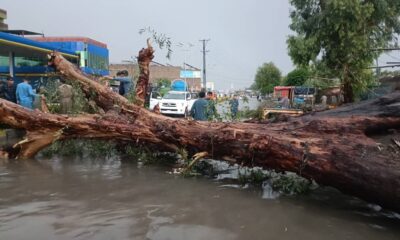
 Latest News4 days ago
Latest News4 days agoOne dead, dozens injured as powerful storm strikes Jalalabad, Afghanistan
-

 Latest News4 days ago
Latest News4 days agoEx-Afghan deputy speaker Qadeer back in Kenyan court for criminal case
-

 Health4 days ago
Health4 days agoJapanese charity Peshawar-Kai to resume leprosy treatment in Afghanistan
-

 Sport4 days ago
Sport4 days agoIndia suspends Indian Premier League T20 cricket tournament
-

 Latest News3 days ago
Latest News3 days agoPakistan says India launched attack on Afghanistan, India denies


